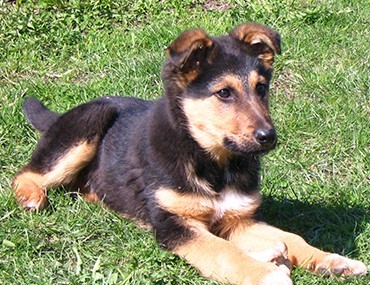Those of us who’ve raised a dog or two are familiar with how fast dogs can grow, especially when they’re puppies. Sometimes, it seems as if they gain inches and pounds by the hour!
Occasionally, however, rapid growth in puppies and adolescent dogs can lead to complications. Especially in large/giant breed puppies, inflammation in the growth plates of longer, larger bones can lead to what’s known as hypertrophic osteodystrophy (HOD). While HOD can be very painful, it is usually a self-limiting condition with no permanent side-effects, meaning puppies simply outgrow it. There are rare cases, however, in which growth plates are permanently damaged, resulting in deformed legs.
Risks/Symptoms
HOD usually affects puppies from 2-8 months old. Some breeds that are most commonly affected include:
- Irish Setters
- German Shepherds
- Labrador Retrievers
- Doberman Pinchers
- Basset Hounds
- Great Danes
HOD can be very painful, usually affecting multiple limbs and causing severe joint discomfort. Other symptoms include:

- Swelling in the joints
- Painful joints
- Lameness
- Fever
- Loss of appetite
Diagnosis/Treatment
In order to diagnose HOD, your veterinarian will perform a complete physical exam and get a detailed history of your pooch. He or she will also likely recommend x-rays of the affected limbs, and other diagnostic testing may also be needed for a more accurate diagnosis.These tests may include:
Chemistry tests to evaluate kidney, liver, and pancreatic function, as well as sugar levels- Electrolyte tests to ensure your dog isn’t dehydrated or suffering from an electrolyte imbalance
- A complete blood count to screen your pet for infection, inflammation, or anemia and other blood-related conditions
- Urine tests to screen for urinary tract infection and other diseases, and to evaluate the ability of the kidneys to concentrate urine
- Screening tests to rule out infectious disease
Treatment for HOD usually involves anti-inflammatory medication to help relieve pain and swelling in the joints. Rest will also be recommended. After a few weeks, most puppies will begin to improve. Your veterinarian will establish a treatment plan that is best for your furry friend.
Prevention
The cause of HOD isn’t entirely known, though some think it has something to do with high-protein diets or lack of Vitamin C. However, there haven’t been any studies that can prove this theory. Because the cause of HOD isn’t known, it’s pretty hard to prevent the onset of HOD.
If you have any questions or concerns, you should always visit or call your veterinarian – they are your best resource to ensure the health and well-being of your pets.
